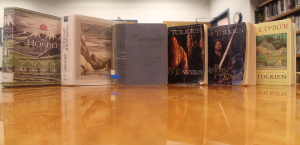
by Brooke Lavite
Staff Writer
Fans of epic poetry or J. R. R. Tolkien, may appreciate the posthumously released translation of Beowulf. Next month Tolkien’s unreleased translation will be published.
Beowulf is an epic poem about a protagonist of the same name, who conquers a monster with his bare hands, saving his people. He later destroys the beast’s mother as well.
The work was originally a part of an oral tradition passed on by scops, Old English bards and poets. Beowulf was written some 1300 years ago; the author is unknown. Scops traveled about, told and retold the story — each story-teller contributing their own style to the work.
Tolkien, famous for The Hobbit and The Lord of the Rings trilogy, translated the Old English epic poem over eight decades ago but had not published his work. His son, Christopher Tolkien, has done the editing of the translation.
The manuscript of Beowulf has been translated into over 70 languages. Beowulf was written in Old English which is much different than modern English. Many people equivocate Old English with Shakespearian language but Shakespeare was speaking a form of modern English.
“Because Old English was so much more Germanic, modern English is a mutt of the original, ancient German. Beowulf needs a translation in modern English just so people can understand it,” Instructor Steve Higgins said.
Modern English is very obscured from Old English, this is why it is relevant for new translations of old works. Retranslating allows for our ever changing language to keep these works in proper context.
“I would be interested in older literature if it was in modern context because I would wonder what was written and if I could apply any of it to my life now to make things different; it may make me appreciate the modern world more” Kadi Lenhardt, majoring in Paramedicine said.
Tolkien’s estate has announced that the translation will be published by HarperCollins on May 22, 2014.




